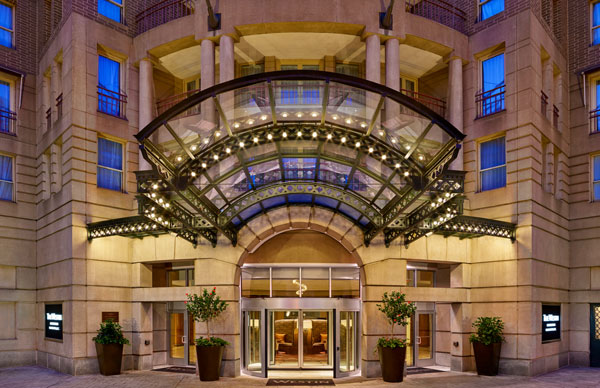The hospitality industry has been among the most remarkably dynamic at systematically changing its structural framework for the betterment of our ecosystem. As gb&d reported in the Typology section of our July/August 2015 issue, the hotel business in particular has embraced green adaptations such as electric vehicles and charging stations, the utilization of solar and geothermal energies, and a host of policy implementations designed to dramatically reduce waste. Essential adjustments in business practices such as these have long been exemplified by the Starwood Hotels enterprise, and more specifically, the Westin Georgetown has been an active agent in the cause to turn our built environments into positive appendages for our natural environment.

The Westin Georgetown has been an active agent in the cause to turn our built environments into positive appendages for our natural environment.
One of the novel ways the Westin Georgetown has managed to diminish energy consumption is by automating the scheduling of systems that demand energy. For example, the hotel has adopted the Evolve keycard software: after a fixed length of idleness in a given room, lighting, air conditioning, and any electronic devices shut down automatically until the assigned room keycard is reinserted by a guest, thereby prompting electricity activity to resume once again. The effortless Evolve implementation has come a long way, resulting in a 30% reduction in the level of the hotel’s greenhouse gas discharge. As an added touch of green, the components now subject to automation have also been replaced by greener alternatives. Throughout the hotel, for instance, retrofits of Compact Fluorescent Lighting (CFL) and LED lighting were conducted, altogether resulting in a steady 10% electricity reduction since 2008.

Also steadfast has been Westin Georgetown’s waning water usage. “Our water consumption has reduced 19.5% since 2008, or three million gallons per year,” Paul Zalocha, Westin Georgetown director of sales and marketing, points out. The approach has been a largely mathematical one, installing meters to monitor and collect data to enable better-informed adjustments. Presently, for example, sink faucets are fixed to meet a standard use of 2.2 gallons per minute, while bathroom urinals meet a minimum standard of 0.5 gallons per flush. Aside from minimizing usage, the source of water has been refined slightly as well, instituting a rainwater and treated wastewater collection system to satisfy hotel needs of this scarce resource in a more practical and conscious way.

These efforts were pushed and embraced collectively within the company, and they haven’t gone unnoticed. “Sustainability is compatible with the beliefs of a lot of our associates and managers,” Zalocha illustrates, which made it a perfectly natural sequence of events. And as the Westin Georgetown has received a number of accolades from a multitude of organizations for the steps they’ve taken advancing sustainability in hospitality, they have plenty to show for it. In addition to receiving the first-ever supplier Gold Medal from Project ICARUS (their highest award), the hotel has been granted a Clean the World distinction for recycling discarded toiletries, donating hygiene products to impoverished peoples, and diverting waste by ultimately 71%, proving it’s indeed possible to help the environment while aiding the less fortunate in the process.

